
A22 Sports Management still hope to revive the European Super League (ESL), but even with the firm support of Real Madrid, Barcelona and Juventus, it is a tricky task.
New chief executive Bernd Reichart has already written to UEFA president Aleksander Ceferin seeking immediate dialogue and is cautiously optimistic Europe's top clubs will back a new format that purportedly sees them play meaningful games more often.
"Phase one of my responsibility is to initiate and conduct dialogue," Reichart told CBS Sports. "We want to reach out to stakeholders of the European football family and discuss with them openly, honestly and without the threat of sanctions the underlying problems European football is facing.
"I believe there is a broader consensus that football is facing existential problems. I think it is good if big European clubs take the lead and live up to their responsibility. I also believe European clubs, and the whole football ecosystem, must be prepared for change that might be around the corner. Clubs should be aware and look to protect their interests."

Golazo Starting XI Newsletter
Get your Soccer Fix from Around the Globe
Your ultimate guide to the Beautiful Game as our experts take you beyond the pitch and around the globe with news that matters.
Thanks for signing up!
Keep an eye on your inbox.
Sorry!
There was an error processing your subscription.
Is the ESL legally possible?
A22's most pressing problem is they currently have no legal ability to start a European Super League because UEFA hold a monopoly on organising trans-continental European club competition. That means a competitive ESL is not only rogue, but an illegal venture.
Clubs who join it could be expelled from their domestic leagues and players potentially see their UEFA registrations revoked. The PGA Tour did something similar when Greg Norman's new Saudi-funded LIV Golf tour launched creating instant fractures within the sport.
To avoid this scenario, A22 are co-claimant on an anti-competition case at the Court of Justice of the European Union (CJEU) which they believe will grant them legal authority to found a European Super League with UEFA-member clubs. A ruling is expected in Spring 2023.
"In Europe, governance resides only with UEFA, a private association sitting in Switzerland who is the regulator, gatekeeper and sole commercial operator of competitions. No one can explain to me why," said Reichart, who was chief executive of TV channel RTL Deutschland before joining A22.
"We are challenging this with the CJEU. We think clubs should be masters of their own destiny. The reason for this is there are a lot of clubs who currently don't see a meaningful pathway or access to European competition because it's not actually giving them a base to change their economics – certainly not off the back of just a one-year qualification. Many clubs enter an economic lottery by accessing the Champions League one season only to not be there the next.
"Our argument is UEFA's monopoly over club competitions is not compliant with European competition law. We will always respect anything a European tribunal and authority decides. But I personally believe you can't be judge, jury, regulator, gatekeeper and commercial operator all at once.
"We expect to have a legal resolution in March or April next year. But there is another checkpoint on December 15 – right ahead of the World Cup Final – when the Advocate General will make a non-binding recommendation on the case."
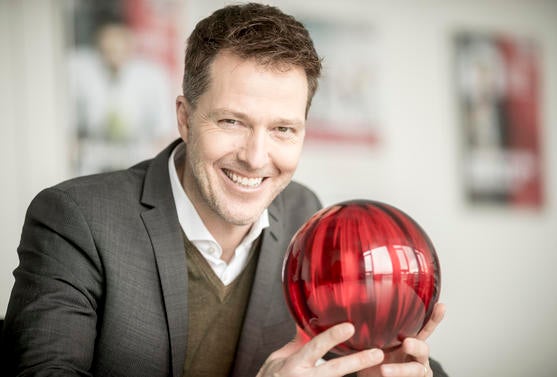
Paramount+ is the only place to watch every minute of every UCL match this season in addition to Serie A, NWSL, Europa League and more. Sign up now with code UEFA22 for one month free for new users and don't miss any of the action. A subscription not only gives you access to all the soccer you could want but also the NFL on CBS, and countless movies, shows and original content.
Can the ESL recover from its humiliating launch?
Even a legal victory, though, can't just Matrix-style erase the dramatic and disastrous initial ESL launch of 18 April, 2021.
At close to midnight European time, 12 teams insouciantly announced they were joining a new European Super League, only for nine to spectacularly U-turn within 48 hours following both fan protests and bullish threats from their own leagues. Managers and players were largely not consulted with many only learning of their club's participation after the media release was out.
The three 'remaining' teams, Real Madrid, Barcelona and Juventus, are monogamously married to the idea. But there is no longer an appetite from Premier League clubs, who are deemed essential to the success of the venture.
2021 ESL Founding Members |
Juventus |
Barcelona |
Real Madrid |
Atletico Madrid (withdrew) |
Inter (withdrew) |
Milan (withdrew) |
Arsenal (withdrew) |
Chelsea (withdrew) |
Liverpool (withdrew) |
Manchester City (withdrew) |
Manchester United (withdrew) |
Tottenham Hotspur (withdrew) |
Sources tell CBS Sports that Arsenal, Chelsea, Liverpool, Manchester City, Manchester United and Tottenham have agreed to "collectively oppose" a new European Super League even if A22 secure a legal mandate to operate next year.
"Given how botched that episode was does anybody have an appetite for something like that?" questioned Chelsea's American co-owner Behdad Eghbali at the 'Sportico Invest in Sports' conference in New York. "A couple of teams in Spain do and they are vocal about it, but everyone else doesn't want to go there anymore."
Under new American ownership, Chelsea are undoubtedly open to innovative revenue-driving formats, including a Premier League versus Serie A match. Club chairman Todd Boehly has also touted an All-Star Game. But the ideas being formatively explored – which also include a six-team Premier League-run pre-season tournament in America – are exhibition or friendly-led and aimed at attracting sponsorship and TV partners not restructuring or toppling the UEFA pyramid.
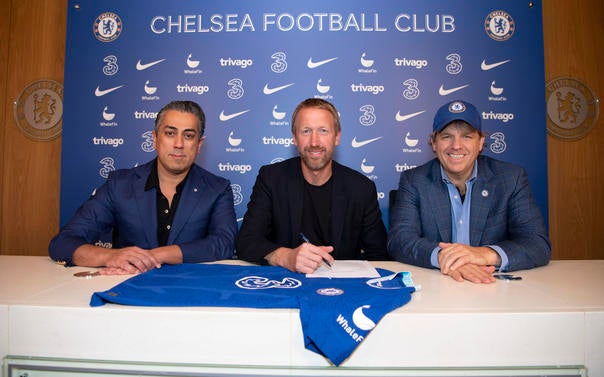
What type of format is being discussed?
That's really the key difference here – A22 are trying the shift the power dynamic at the very core of European football.
The original European Super League relied on (and was essentially founded for) its 12 founding members. The idea was to offer them, plus three other invited clubs, franchise-like protection leaving only five spots available per season based on merit for so-called "annual qualifiers". This not only painted those joining as arrogant and power hungry, it betrayed one of football's most fundamental principles: promotion and relegation.
In hindsight, A22 accept this model was a mistake and are now planning an open ESL with every place earned in the hope it's more palatable to stakeholders and fans.
"You can tell there has been a process of listening, learning, reassessing and now reaching out again with a different approach," said Reichart. "We are now talking about an open format that will be connected and complimentary to domestic leagues and based on sporting merit. Concepts that have previously been heavily criticized, like permanent membership, have been taken off the table.
"Right now, we don't have a clear format proposition. The dialogue we are about to engage in is an honest one. We start conceptually, in a way from scratch, and want to reach out to find the best solution for every participant."
Whatever format is chosen, A22 argue it will be simpler than UEFA's new Champions League model which comes into force in 2024/25.
The day after the ESL launched, UEFA's reforms received unanimous backing from both the European Club Association (ECA) and the UEFA Club Competitions Committee. And in a dig at the ESL, Ceferin stressed the revamped UCL will "enable long-term viability, prosperity and growth for everyone in European football, not just a tiny, self-selected cartel."
From 2024/25, the UCL will ditch its 32-team group stage and revert to a single 36-team league. Each side will play 10 different opponents. The top eight teams will advance to the last 16 and a playoff for teams placed ninth to 25th will decide the other eight to progress. The Europa League and Europa Conference League will adopt the same format, which A22 think lacks clarity.
"UEFA's Champions League changes are not moving in the right direction. They are complicated for fans to follow," said Reichart, who believes A22's ESL could also be ready for the 2024/25 season.
"We are looking to engage young audiences with meaningful matches. We believe this is the best way to compete with a growing number of alternative entertainment options. The earliest reasonable start date is 2024/25 but if it takes longer so be it. We want to make a solid, sustainable well-designed format that has consensus from all major stakeholders."
But getting a consensus is easier said than done. The ESL is fiercely opposed by the ECA, whose chairman, Nasser Al-Khelaifi, is also president of Paris Saint-Germain. That means no chance of Lionel Messi, Kylian Mbappe or Neymar joining whilst they are in Paris.
"I will not spend much time talking about the not-so-Super League," said Al-Khelaifi. "I do not like to focus on fabulists and failures. President Ceferin stood up to the midnight coup and people with short memoires should remember that this is exactly what it was. While rebel clubs waste energy, twist narratives and continue to shout at the sky, we [at the ECA] focus every energy on building a better future for European football."
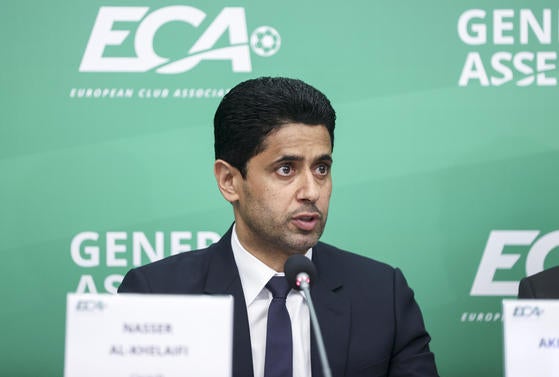
Perhaps the main hope for both A22 and Real Madrid, Barcelona and Juventus, is the ECA's position is somewhat changeable given it is ultimately a reflection of its leadership. And key board members up for re-election next year, including Al-Khelaifi. There is no indication yet if he'll stand again.
ECA sources tell CBS Sports that Boehly views regular and frank dialogue with UEFA as essential, having met Ceferin in Croatia during Chelsea's 1-0 UCL loss to Dinamo Zagreb back in September. And they believe Chelsea's American chairman "will be tempted" to stand for a position on the ECA board.
This is a move A22 would welcome despite Chelsea being openly against their plans. Although they have held no talks to date, Reichart views Boehly as someone whose mind he can change and is encouraged to see him looking at sports like baseball and American football for inspiration and best practices.
"I think innovative voices help contribute towards a productive dialogue," he said. "Todd's opinions, and converse ones, are both highly productive. I think he is smart to learn from other sports and that's what we are doing as well. Why not look at the NFL? This is possible without betraying the tradition of football.
"And my message to Nasser is he can join in as well. But I believe the ECA is too tied to UEFA in a lot of their articles and statutes. So I think they can't be the only forum for clubs to engage in a dialogue about their future and the upcoming changes we believe will happen."
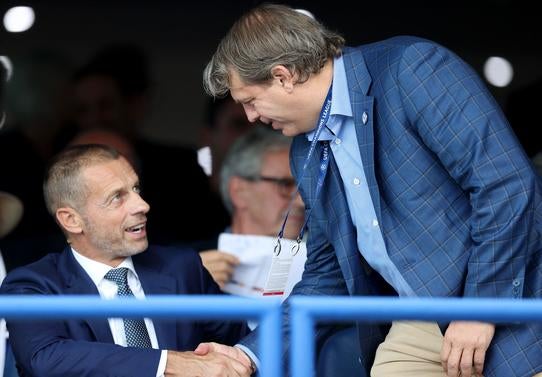
Will Europe's big leagues ever endorse the ESL?
A22 must also win over Europe's big five leagues if they want their European Super League to sit seamlessly within the existing football pyramid. And the vague promise of 'connectivity' between domestic and European competition, or a U-turn on their closed format, isn't likely to be enough to pacify critics.
Senior representatives at the Premier League, LaLiga, Serie A, Ligue 1 and the Bundesliga have all told CBS Sports they won't engage with A22.
"These guys are not going to be taken seriously due to the kamikaze approach they took last year," said one senior source from a major European League. "This is a lousy attempt to reinvent themselves. They can't come back from the dead – even though it [was just] Halloween. It just looks like they hired a Ken to try to build credibility. It all looks very artificial."
"A22 are quite clearly pre-positioning themselves ahead of the legal judgement," added another spokesperson from within Ligue 1. "It's just PR to try and make themselves relevant ahead of when they inevitably lose. They are trying to make everyone forget that 18 months ago they launched a closed league at midnight to try and steal football.
"Real Madrid, Barcelona and Juventus want a closed league that allows them to make more money. They really don't give a damn about any other clubs. And it's both insulting and pretty comical that the leading voices from each are three old, grey-haired blokes [Florentino Perez, Joan Laporta and Andrea Agnelli] trying to tell young people what they should think."
Europe's top leagues also take issue with the notion there aren't enough 'meaningful' matches in football stressing the whole beauty of the sport is its unpredictability.
Old or iconic rivalries are usually box office, and both viewing and revenue data backs that up, but new foes can still emerge. Plus, if the volume of fixtures between football's heaviest hitters increases perhaps some games would feel hollow, especially if less at stake.
The Champions League this season has also shown surprises are not only possible but highly captivating – just look at Club Brugge's run to the last 16, Maccabi Haifa's 3-1 victory over Juventus or Dinamo Zagreb's 1-0 win over Chelsea. This shows the value of having 'underdogs' in European competition.
Simply put, A22 want football's mega-clubs to meet more often. They believe it is what young audiences crave and will ultimately pay for. And Real Madrid's president Florentino Perez maintains tennis shows the worth of this approach.
"Rafa Nadal and Novak Djokovic have faced each other 59 times," he said at the club's AGM in October. "Is that boring? These historic clashes have grown tennis as a whole. Yet Real Madrid and Liverpool have only met nine times in 67 years. What is the point of depriving supporters of these matches?"
"Are you bored of seeing Manchester United versus Liverpool twice a year?" added Reichart. "Or look at El Clasico. I think the big rivalry of Cristiano Ronaldo against Lionel Messi over more than a decade has fascinated a lot of young people who became football fans. And that wouldn't have been possible unless Madrid and Barcelona played two or three times a year.
"These matches have drawn more global audiences than any other in European football. And looking at the data, you get a sense that inconsequential matches, not relevant in terms of a competition's outcome, are less attractive than the big games."
Perez's tennis analogy isn't particularly apt since Nadal and Djokovic still earn the right to play each other. It's never guaranteed in competitive tennis. If it was, it wouldn't necessarily have the same buzz or intensity and with less to play for perhaps the quality of tennis would diminish, too.
But Reichart is correct to point out the global appeal of El Clasico. And so the key question is, do Real and Barca play often enough already? And if they met at the same volume as Nadal and Djokovic would it still be as exciting?
The reason the Premier League is so enthralling is not just because of fixtures between the big six. There are no easy games.
Liverpool beat champions Manchester City on October 16 yet lost to bottom side Nottingham Forest a week later, and lost to Leeds the week after that; and who could forget Leicester City's fairy tale Premier League win back in 2015/16.
This is clearly the unpredictability and drama the ESL is striving for. But to achieve it, a high-volume of games would be required that could very plausibly weaken domestic competition and that's why top leagues are so opposed to it.
Fans, on the other hand, do relish the big games, but game-day culture, coupled with the wonderful chaos any matchday can bring, shouldn't be discounted. So framing trans-continental fixtures around the so-called big clubs might play well with a global TV audience but it could also alienate huge portions of hardcore ticket-buying supporters, especially those following smaller clubs.
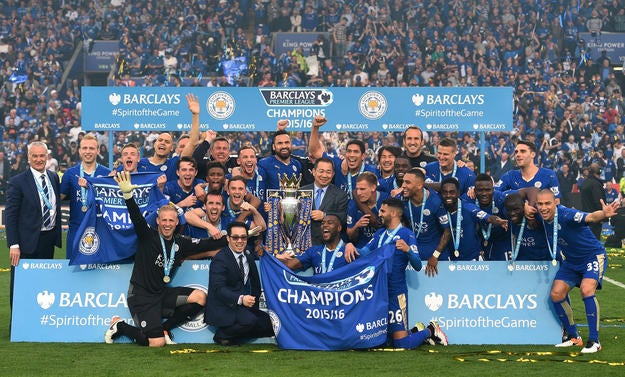
Will fans be consulted?
A22 do plan to consult a diverse range of fans and repeatedly maintain the European Super League won't be founded solely for the elite. Teams participating will be chosen on merit, but there remain unanswered questions as to how exactly this is defined given any format will still be led by Europe's biggest clubs and brands.
For example, there is a chance merit is deemed historical rather than seasonal. ESL entrants could be selected based on a coefficient ranking established by organizers to effectively pick and choose the majority of clubs they want regardless of their individual league finish in a specific season. If similar to UEFA's own club rankings, this would allow a club like Manchester United, who are ranked eighth, to pretty much always enter even though they didn't qualify for the Champions League last season. It would also protect Barcelona and Juventus, who were both knocked out the UCL on matchday five.
Most fans are only likely to listen if A22 categorically confirm "merit" means based on league finishes in the previous season with spots per country allocated in a similar fashion to UEFA's current quotas.
Interestingly, A22 do stress ESL games won't be staged at neutral venues abroad, which is another major fan concern. The primary value in the European Super League comes from selling global television rights deals and sponsorship rather than playing in any particular location.
A22 are planning a series of fan forums to hear out concerns with further details to be released once their legal situation becomes clearer. But the Arsenal Supporters' Trust have confirmed joining any new venture would be "the death of Arsenal as a sporting institution."
The Chelsea Supporters' Trust "wholeheartedly oppose a breakaway league" and Liverpool's Spirit of Shankly group last year accused their owner, Fenway Sports Group, of "ignoring fans in their relentless and greedy pursuit of money."
Equally strong opposition has come from Manchester United, Manchester City and Tottenham further showcasing just how hard it will be to win over Premier League fanbases in particular.
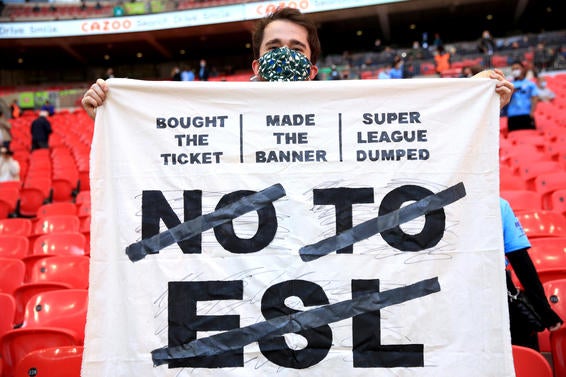
How is the ESL being funded?
A22 believe fans will be won over by being included in the dialogue over the new format. And they argue if clubs benefit financially they'll be a trickle-down effect on supporters.
But one key question all stakeholders have is how a new European Super League will be funded in the first place. The original ESL was seemingly pre-funded by JP Morgan to the tune of almost $5 billion. But Munich-based newspaper Süddeutsche Zeitung (SDZ) reported this money "did not really come from the New York bank" alleging they were merely an intermediary to house Saudi cash.
Several sources within European football have raised similar suspicions directly to CBS Sports that the money trail leads back to Saudi Arabia, although JP Morgan insiders are adamant they were (and perhaps still are) "the sole financer." A22 failed to deny Saudi links and refused to elaborate on the exact source of their funding.
"I am CEO of A22, so you have to respect I can't speak on behalf of the ESL company," said Reichart. "As of today this is not my concern. But what's important to understand is that a European competition can't just be launched and then immediately played. There has to be a certain amount of preparation. We have to produce a format and secure broadcast partners and venues.
"If there is legal certainty for us to run a European competition, it gives us headway and there is less need for pre-financing. We shall see how the course of event plays out and then we will be able to be a little bit more concrete on the planning and financing."
A22 might not be qualified or permitted to discuss the ESL's finances, but it is important to note they are 50% owned by Anas Lagrahi – CEO of Key Capital, Perez's go-to broker – and John Hahn, an American private equity executive. So effectively, the European Super League is being formulated by bankers, who haven't chosen to share how they are raising their funds.
Like any business, they aren't obligated to do so but surely the only chance A22 have to make a success of the European Super League is to be fully transparent.
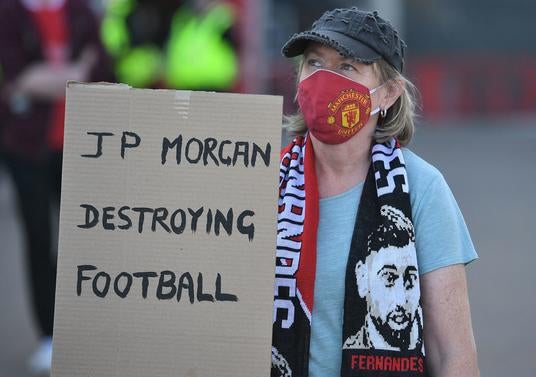
So is the ESL really back?
A22 are confident of progressing with dialogue but almost all stakeholders fail to recognize their authority. Ceferin has already dismissed it telling reporters in Argentina in October the project was "dead".
To truly revive the ESL, first and foremost A22 must win their battle in court. And from there, they'll need a clear and open format. Even with it, club, league and fan backing will prove a big and potentially insurmountable hurdle.
A22 must also prove, not just say, their new format is sustainable and financially lucrative since there is no way, with an already congested fixture calendar, it can exist concurrently with the Champions League – and to replace it, the financial reward would have to be both beneficial to all and astronomical to make most stakeholders re-consider. Otherwise it wouldn't be worth the risk of breaking away from UEFA.
Although Real Madrid, Barcelona and Juventus remain pro-ESL 'rebels', the vast majority of clubs plan to collectively and aggressively oppose the ESL and instead continue to push for reforms from within UEFA, perhaps even using parts they like from any alternative format as leverage.
All this means the European Super League is really only back by name... but that name is so muddied it's hard to see how it can succeed, however strong the financial backing or forward-thinking ideas are. The trust is still lacking and even a legal win won't just magically restore it.





















